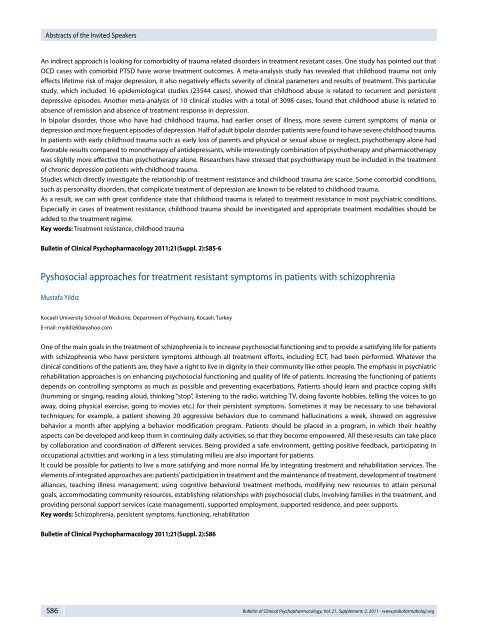SYMPOSIA
SYMPOSIA
SYMPOSIA
Create successful ePaper yourself
Turn your PDF publications into a flip-book with our unique Google optimized e-Paper software.
Abstracts of the Invited Speakers<br />
An indirect approach is looking for comorbidity of trauma related disorders in treatment resistant cases. One study has pointed out that<br />
OCD cases with comorbid PTSD have worse treatment outcomes. A meta-analysis study has revealed that childhood trauma not only<br />
effects lifetime risk of major depression, it also negatively effects severity of clinical parameters and results of treatment. This particular<br />
study, which included 16 epidemiological studies (23544 cases), showed that childhood abuse is related to recurrent and persistent<br />
depressive episodes. Another meta-analysis of 10 clinical studies with a total of 3098 cases, found that childhood abuse is related to<br />
absence of remission and absence of treatment response in depression.<br />
In bipolar disorder, those who have had childhood trauma, had earlier onset of illness, more severe current symptoms of mania or<br />
depression and more frequent episodes of depression. Half of adult bipolar disorder patients were found to have severe childhood trauma.<br />
In patients with early childhood trauma such as early loss of parents and physical or sexual abuse or neglect, psychotherapy alone had<br />
favorable results compared to monotherapy of antidepressants, while interestingly combination of psychotherapy and pharmacotherapy<br />
was slightly more effective than psychotherapy alone. Researchers have stressed that psychotherapy must be included in the treatment<br />
of chronic depression patients with childhood trauma.<br />
Studies which directly investigate the relationship of treatment resistance and childhood trauma are scarce. Some comorbid conditions,<br />
such as personality disorders, that complicate treatment of depression are known to be related to childhood trauma.<br />
As a result, we can with great confidence state that childhood trauma is related to treatment resistance in most psychiatric conditions.<br />
Especially in cases of treatment resistance, childhood trauma should be investigated and appropriate treatment modalities should be<br />
added to the treatment regime.<br />
Key words: Treatment resistance, childhood trauma<br />
Bulletin of Clinical Psychopharmacology 2011;21(Suppl. 2):S85-6<br />
Pyshosocial approaches for treatment resistant symptoms in patients with schizophrenia<br />
Mustafa Yıldız<br />
Kocaeli University School of Medicine, Department of Psychiatry, Kocaeli, Turkey<br />
E-mail: myildiz60@yahoo.com<br />
One of the main goals in the treatment of schizophrenia is to increase psychosocial functioning and to provide a satisfying life for patients<br />
with schizophrenia who have persistent symptoms although all treatment efforts, including ECT, had been performed. Whatever the<br />
clinical conditions of the patients are, they have a right to live in dignity in their community like other people. The emphasis in psychiatric<br />
rehabilitation approaches is on enhancing psychosocial functioning and quality of life of patients. Increasing the functioning of patients<br />
depends on controlling symptoms as much as possible and preventing exacerbations. Patients should learn and practice coping skills<br />
(humming or singing, reading aloud, thinking “stop”, listening to the radio, watching TV, doing favorite hobbies, telling the voices to go<br />
away, doing physical exercise, going to movies etc.) for their persistent symptoms. Sometimes it may be necessary to use behavioral<br />
techniques; for example, a patient showing 20 aggressive behaviors due to command hallucinations a week, showed on aggressive<br />
behavior a month after applying a behavior modification program. Patients should be placed in a program, in which their healthy<br />
aspects can be developed and keep them in continuing daily activities, so that they become empowered. All these results can take place<br />
by collaboration and coordination of different services. Being provided a safe environment, getting positive feedback, participating in<br />
occupational activities and working in a less stimulating milieu are also important for patients.<br />
It could be possible for patients to live a more satisfying and more normal life by integrating treatment and rehabilitation services. The<br />
elements of integrated approaches are: patients’ participation in treatment and the maintenance of treatment, development of treatment<br />
alliances, teaching illness management, using cognitive behavioral treatment methods, modifying new resources to attain personal<br />
goals, accommodating community resources, establishing relationships with psychosocial clubs, involving families in the treatment, and<br />
providing personal support services (case management), supported employment, supported residence, and peer supports.<br />
Key words: Schizophrenia, persistent symptoms, functioning, rehabilitation<br />
Bulletin of Clinical Psychopharmacology 2011;21(Suppl. 2):S86<br />
S86 Bulletin of Clinical Psychopharmacology, Vol: 21, Supplement: 2, 2011 - www.psikofarmakoloji.org



